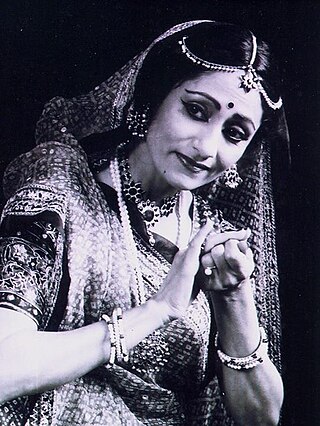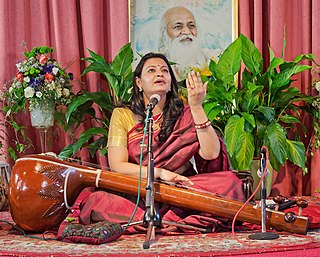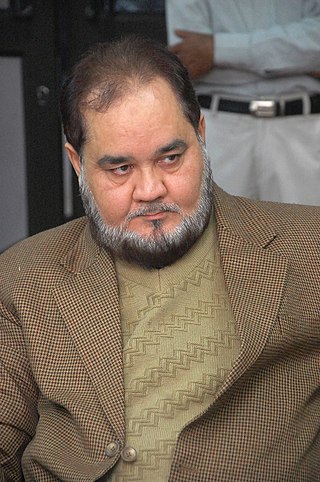
Sir Syed Ahmad Khan, also spelled Sayyid Ahmad Khan, was an Indian Muslim reformer, philosopher, and educationist in nineteenth-century British India.

Madras Music Academy is one of the earliest established music academies in South India. Before the concept of infrastructure was introduced to India in the early 1920s, it was a gathering for elite musicians simply called Music Academy It plays an important role in encouraging and promoting primarily the Carnatic Music Indian art form. It played a vital role in the revival of the Indian classical dance form of Bharatnatyam in the 1930s when it faced near extinction due to a negative connotation caused by conservative societal standards.

Ahl-i-Hadith or Ahl-e-Hadith is a Salafi reform movement that emerged in North India in the mid-nineteenth century from the teachings of Sayyid Ahmad Shahid, Syed Nazeer Husain and Nawab Siddiq Hasan Khan. It is an offshoot of the 19th-century Indian Tariqah-i-Muhammadiya movement tied to the 18th-century traditions of Shah Waliullah Dehlawi and the Wahhabi movement. The adherents of the movement described themselves variously as "Muwahideen" and as "Ahl e-Hadith."

Shubha Mudgal is an Indian singer, and composer, known for her works in Hindustani classical music, Indian pop, and Tamil cinema. Her repertoire includes the genres of khyal, thumri, dadra. She has received the Padma Shri in 2000.

The Society for the Promotion of Indian Classical Music And Culture Amongst Youth, abbreviated as SPIC MACAY, is a voluntary youth movement which promotes intangible aspects of Indian cultural heritage by promoting Indian classical music, classical dance, folk music, yoga, meditation, crafts and other aspects of Indian culture; it is a movement with chapters in over 300 towns all over the world. SPIC MACAY was established by Dr. Kiran Seth in 1977 at IIT Delhi.

Uma Sharma is a kathak dancer, choreographer and teacher. She also runs the Bharatiya Sangeet Sadan, a classical dance and music academy, situated in New Delhi, founded by her father in 1946. She is most known for reviving the old classical dance form of Natwari Nritya or the Raslila of Brindavan, which later evolved into the Kathak.

Lakshmi Rajagopalan is a leading Carnatic vocalist in India.
Sumati Mutatkar was an Indian classical music vocalist and musicologist from the Agra gharana of Hindustani classical music, and a Professor of Department of Music in University of Delhi.

Dr.M.Narmadha born 11 April is a celebrated popular third generation heritage violinist who performs solo violin concerts in both Carnatic and Hindustani classical systems of Indian Music.

Bharat Gupt is an Indian classicist, theatre theorist, sitar and surbahar player, musicologist, cultural analyst and newspaper columnist. He is also a retired Professor in English, who taught at the College of Vocational Studies of the University of Delhi. In February 2023, he received the Sangeet Natak Akademi Award by the President of India for his contribution to musicology.
Debopriya Chatterjee and Suchismita Chatterjee are sisters by birth, popularly known as the "flute sisters". They are Indian Hindustani music artists who play instrumental Indian flute music.
Qāḍī Sayyid Rāfiʿ Muḥammad Dasondhi was a scholar of repute from Sakras, District Gurgaon. He belonged to the family of Gardēzī Sadaat.
Prem Lata Sharma was an Indian musicologist.

Sharan Rani was an Indian classical sarod player and music scholar.

Leela Omchery was an Indian classical singer, musicologist and writer. She is known for her contributions to classical music and was a recipient of the Padma Shri award from the Government of India for her contributions to Indian classical dance and music.

Rani Karnaa was an Indian classical dancer, known for her proficiency in the Indian dance form of Kathak, and regarded by many as one of the greatest exponents of the art form. She was honoured by the Government of India, in 2014, by bestowing on her the Padma Shri, the fourth highest civilian award, for her services to the field of dance.

Vidushi Sumitra Guha is an Indian classical vocalist, known for her expertise in the Carnatic and Hindustani schools of classical music. The Government of India honored her in 2010, with the fourth highest civilian award of Padma Shri and in 2020 with a Sangeet Natak Akademi award.
Vinay Chandra Maudgalya was an Indian classical musician, vocalist and the founder of Gandharva Mahavidyalaya, a music and dance academy for the promotion of Hindustani music and Indian classical dances. He was a follower of Gwalior gharana. The Government of India awarded him the fourth highest Indian civilian honour of Padma Shri in 1984.

Meeta Pandit is a Hindustani Classical vocalist and a leading exponent of the Gwalior Gharana. She is the granddaughter and disciple of Krishnarao Shankar Pandit and daughter of Laxman Krishnarao Pandit. She is the sixth in the unbroken lineage and the first woman in the family to have taken up music as a profession.

Syed Muhammad Ashraf also known as S. M. Ashraf is an Indian Retired Civil Servant (IRS) and an Urdu novelist and short-story writer of distinction. He is first person to qualify civil service examination in Urdu language in India. He has written novels and several collections of short stories. Some of his stories have been translated into English and other languages. He has received the Sahitya Academy Award in 2004 and Aalmi Farogh-e-Urdu Adab Award by Majlis-e-Farogh-e-Urdu Qatar in 2018.














